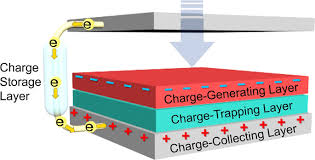Ryan Walden
Current PhD Student
Development of Supercapacitor-Triboelectric Nanogenerators (SC-TENGs) for Wearable Technology.
Department: Environmental Science
The base of my research will be focused on synthesising a new polymer which will optimise the output of wearable Triboelectric Nanogenerators (TENGs).
A TENG is a small electrical generator which converts mechanical energy (human motion, vibration, etc) into electrical energy by coupling the triboelectric effect and electrostatic induction. Explained briefly; two materials, of opposite charges are forced together through mechanical force. While together electrons move from the negative materials surface to the positive materials surface. When these materials are separated, again by a mechanical force, the electrons are left abandoned on the surface of the positive material, creating a potential drop. This potential drop drives the electrons to flow between the two electrons connected to each of the materials, creating an electrical output.

Figure 1: Diagram showing the basic structure of a Triboelectric Nanogenerator. (Kim et al, 2020)
TENGs have a wide range of uses from optimising ocean and wind energy, to self-powered sensors. The ultimate goal is to eventually incorporate TENGs into clothes by weaving them into fabrics. The clothes then while worn and used will generate power simply though the movement of the wearer. This power will either be stored, to be used at a later time or used to power wearable devices such as smart watches. In order for TENGs to be incorporated in such a way however, they must be small enough to not hinder the user, durable and robust enough to deal with different environments and powerful enough to be useful. This is where the materials in which they are made from come into effect. The material must have properties and qualities of both a wearable fabric such as flexibility, durability and washability, while also maintaining the properties and qualities which are needed for TENG operation such as high triboelectric values, resistance or conductibility and its dielectric constant.
In order to optimise the power output of a TENG, materials which possess all of these qualities and more need to be used. My aim is to create a polymer which optimises all of these qualities.
Personal Background:
I am a confident, charismatic individual who enjoys challenges and problem solving. I graduated in 2019 with a 2:1 Bachelors of Honours degree in “Forensic Science and Analysis” from Sligo IT. My final year project “Forensic Analysis of Wine”, focused on elemental analysis of wine samples in order to “fingerprint” them to their country of origin, to combat fraudulent wine. After my time in Sligo IT, I worked as a Quality Control Analyst for TopChem Pharmaceuticals for a 15-month period, finishing to begin my PhD. While there I was tasked with carrying out routine release testing of raw materials, API’s and Intermediates, while maintaining GMP standards. I was also involved with all activities associated with the analytical method, process validation and instrument calibrations. I possess a wide range of analytical skills that I am always eager to improve upon, which include Spectroscopy (GFFAS, FTIR), Chromatography (GC, Advanced HPLC), Advanced Chemical Analysis and Reporting. After 6 months working, I was tasked with being the Environmental Health and Safety officer for the lab which included carrying out monthly safety assessments.